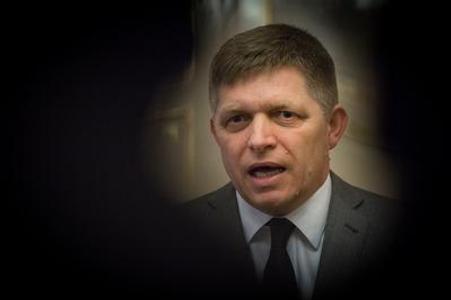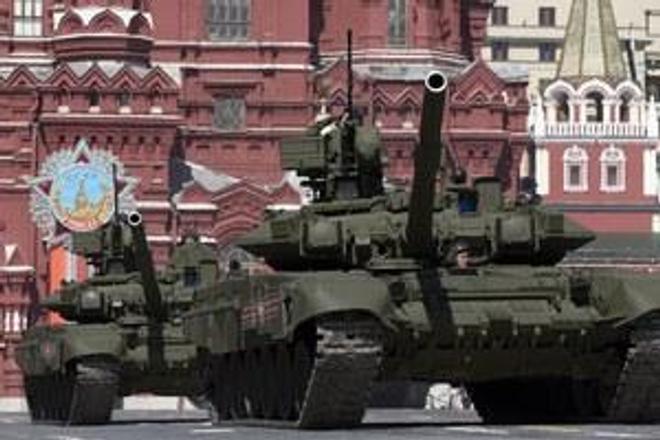“The west was not prepared to consider Russia as the threat and was not prepared for Russia using mass media in a way which is not allowed in civilized world,” the chairman of the Maidan of Foreign Affairs Foundation, a Ukrainian foreign policy think tank, Bohdan Yaremenko told The Slovak Spectator.
The flood of information
Russian media activities are part of information war which has a goal to hide presence of Russian soldiers in Ukraine and Russian participation in this conflict. The second and most important goal is to influence the way people think about Russian politics toward EU, Yaremenko told the Slovak Spectator.
Currently, Russian propaganda is flooding information space not only in Russia itself, but also falls heavily on the Eastern and Southern parts of Ukraine and Belarus where part of society is pro-Russia oriented. Russian propaganda has depicted the 1990s as a period of hardships and unsuccessful economy reforms, and has planted fear of reforms and desire of “stability” at the expense of democratic rights. In Belarus it has “zombifying effect”, aimed to reverse once strong pro-European orientation of the country, according to Vlad Kobets from Belarusian pro-human rights focused news site Charter 97.
“No civilised country would be able to spend such amount of money for creating some elusive picture,” Yaremenko said. “Only a totalitarian country can allow doing such thing.”
Basically the Russia is trying to renew sentiment which post-Soviet countries had after the World War II that Russia is big nice neighbour which gives them money. At the same time it destroys the picture of what Russia was doing during the Soviet era, according to Olga Zakharova, director of the Freedom Files, a Russian research and advocacy NGO focusing on problems of human rights and democracy in authoritarian countries.
She pointed on the recently published Russian documentary Warsaw Pact-Declassified Pages that was aired by the Russian state TV Rossija 1 on May 23. It focused on the year 1968, when the troops of the Warsaw Pact, led by the Soviet Union, entered Czechoslovakia to put an end to the democratisation processes that were taking place in the country at that time.

In contrast with the generally acknowledged view that the invasion was a breach of international law and a violation of the sovereignty of Czechoslovakia, the documentary returned to the rhetoric from before 1989. In it, its authors describe the invasion as a brotherly help from the other socialist nations as a Western-backed armed coup was underway.
“There is a generation of people in post-Soviet countries who can’t remember the history and those who remember it are passing away,” Zakharova told the Slovak Spectator. “Now the history is distorted and manipulated in favour of propaganda."
Methods of manipulation
The propaganda is tactic of war and Russia uses hybrid techniques in several ways to reach its goals including electronic media, energy firms, Russian minorities living in foreign countries and its embassies, according to Yaremenko.
“Under the disguise of improving relations Putin’s Russia was buying up businesses, politicians and media,” Kobets told The Slovak Spectator. “All these elements are now set to action, including those in Slovakia. From Latvia to France the Kremlin is sponsoring anti–EU movements, aiming to destroy EU from the inside.”
The main goal of propaganda is to push its own view of the situation if possible. However, not always it is confrontation of ideas; sometimes the one side has unquestionable facts at its disposal which means that other side loses. In those cases the other side tries to disguise the facts and create impression that the truth cannot be discovered, according to political scientist and head of the Institute for Public Affairs Grigorij Mesežnikov.
For example, there is one trustworthy version of what happened with flight MH17 – which was shot down on 17 July 2014 with 298 passengers on board in Ukraine – described by a team of investigative journalists. On the other hand there are at least three versions of Russian side which are contradicting each other, Mesežnikov added.
“I was reading publications about shot down of the plane and such reading is demanding, people need time to think about the content,” Mesežnikov told The Slovak Spectator. “On the other hand someone writes half-page-long article based on [claims of] non-existing dispatcher and people spread it around.”
Slovakia not prepared
The organised propaganda has been visible since the 2014 even in Slovakia for example by increasing number of pro-Russian oriented websites, according to Mesežnikov. He pointed on teacher and civic activist Juraj Smatana, who recently compiled a list of more than 40 websites spreading the pro-Russian sentiment. Such a number means they have to be funded from the outside, Mesežnikov added.
The country was not prepared for such aggression, however unlike Ukraine or Belarus, Slovakia is a member of EU and NATO, and thus Kremlin has less space for manouvering, according to Kobets.
“Nevertheless, it should come to understanding that this is a real war, a new cold war if you wish,” Kobets said.
Russian propaganda should not be underestimated, however, the situation in Slovakia is not so serious, according to Central European Policy Institute (CEPI) Senior Fellow Jaroslav Naď.
Mesežnikov agrees, saying that influence of pro-Russian website is not so strong as their founders were expecting and they are not shaping mind of significant number of Slovaks.
“The worse thing is that hard news media give unnecessarily big space to such extreme views,” Naď told The Slovak Spectator. “To avoid being called biased media publish so called alternative view even they know that it is nonsense trying to spread hatred.”
Politicians avoid the issue
There is a lack of clear messages of the Slovak government towards public saying what are country’s values, in which group of states it belongs and why. Only President Andrej Kiska and Foreign Ministry have been showing such efforts but the government as a whole is quiet, according to Naď.
“It’s like the government doesn’t see the threat of possible conflict in Ukraine,” Mesežnikov said.
The role of government is partially substituted by third sector which actively fights with propaganda. For example, Smatana participated on the May 27 debate with Tibor Rostas, the publisher of conspiracy-oriented magazine Zem a Vek favouring Russia in the ongoing conflict and it was important to see reposes of the latter, according to Naď.



 (source: TASR/AP)
(source: TASR/AP)